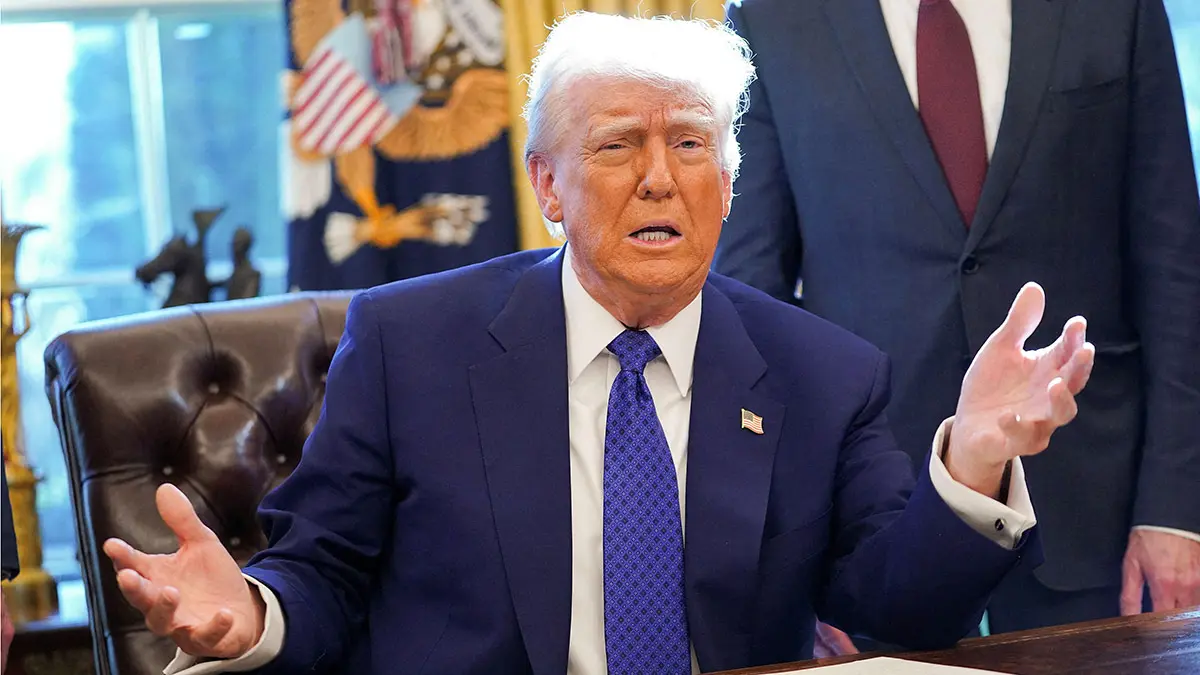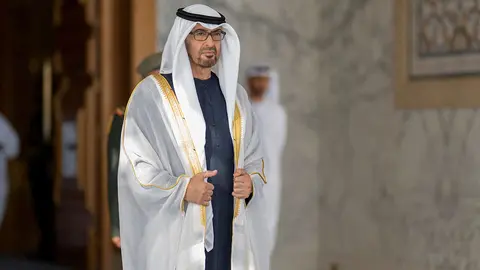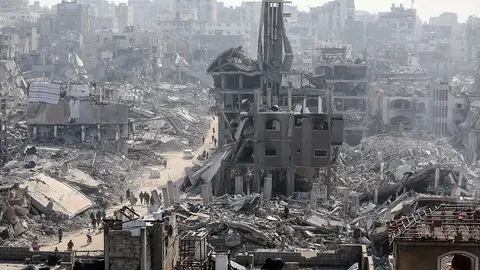The illusion of US order in the Middle East: a catalyst for instability

Donald Trump's recent proposals on Gaza (forced displacement of the Palestinians, US control of the area, transformation into the ‘Middle Eastern Riviera’) are not simply diplomatic manoeuvres. They crystallise a deep strategic rupture, combining contempt for historical realities, short-term security calculations and a lack of understanding of the moral resources that structure the Arab political imagination. This critical moment reveals a fundamental tension: the dependence of Arab regimes on their American protector and friend clashes with a Palestinian cause which, despite recent normalisations, continues to be the basis of their internal and regional legitimacy.
It is not surprising that the announcement of these measures has provoked unanimous rejection, something rare in such a fractured Arab world. Egypt, under President Al-Sisi, who is usually silent in the face of Israeli excesses, has strongly condemned any population displacement towards the Sinai, recalling the spectre of the 1948 refugees. As for Jordan, where Palestinians make up almost 60% of the population, it has threatened an irreversible and irrevocable identity crisis. Even Saudi Arabia, engaged in a strategic tango with Washington over the Iranian nuclear programme and the Abraham Accords, has reaffirmed its commitment to East Jerusalem as the future Palestinian capital. These reactions are not the result of old-fashioned sentimentality. They are the reflection of an existential angst: by instrumentalising Gaza as a geopolitical adjustment variable, Trump is not only threatening a territory, but attacking one of the last unifying narratives of the Arab world, already undermined by civil wars, aborted springs and the rise of Tehran.
In the short term, Arab regimes find themselves trapped in a dilemma of condor proportions. Their survival depends, to a large extent, on the US security umbrella. Egypt, the world's third largest recipient of US military aid, cannot afford to break with Washington, not even when the US mentions the displacement of millions of people from Gaza to Sinai. Saudi Arabia, despite its firm rhetoric, is still trapped in a symbiotic relationship with the United States, from the sale of arms to the protection of oil fields. However, this dependence is turning against it. Arab public opinion, inflamed by the images of the war in Gaza, could begin to see any collaboration with Trump as a betrayal. Social networks are already full of comparisons between the Gulf monarchies and the collaborating regimes of the colonial era. This gulf between realpolitik and popular legitimacy creates fertile ground for jihadist groups or Hamas, which exploit the anger of the younger generations. The risk is not theoretical: in 2021, pro-Palestinian demonstrations in Jordan forced the government to withdraw its ambassador to Israel, a reminder that Arab street opinion remains an unpredictable but unavoidable factor.
This strategic paralysis is exacerbated by the unpredictable style of the new US administration. Its shocking announcements, sometimes threatening to cut aid to Egypt, sometimes promising a fantasised ‘deal of the century’, make any kind of forecast impossible. Arab capitals are sailing by sight, divided between the fear of provoking its wrath and the need to calm their populations. The ‘Gaza Riviera’ project, perceived as reminiscent of old projects from the 1930s aimed at ‘making the desert bloom’, has ignited tempers. In the cafés of Cairo and Beirut, it is perceived as the ultimate humiliation: not only are the Palestinians denied their right to an independent state, but their sacrifice is turned into a tourist attraction. This perception is not only emotional, but is based on a collective memory in which every Western initiative of ‘modernisation’ actually conceals a project of domination.
The real risk is looming in the medium term. If Trump's proposals were to materialise, even partially, they would set a precedent with unforeseeable consequences. His government has broken with established diplomatic principles, adopting a transactional approach in which the primacy of immediate national interests has eclipsed all multilateral logic. The massive displacement of Palestinians would be too open a reminder of the Nakba of 1948, that never-to-be-digested founding trauma. Over the decades, the leaders of some Arab countries have emphasised the Palestinian cause to divert attention from their own internal challenges, such as corruption, inequalities and authoritarian tendencies. This strategy could backfire if international decisions, taken without consultation, radically redefined the situation in Gaza. In such a context, it would be difficult to justify the sacrifices made over the years, whether fruitless armed conflicts or considerable military spending, if the fate of Gaza could be sealed with a simple foreign declaration. The legitimacy of the Gulf monarchies, already weakened by their rapprochement with Israel, would suffer a fatal blow. The king of Jordan, whose dynasty presents itself as the guardian of the Holy Places of Jerusalem, would see his credibility crumble. Even Egypt, which has accepted the siege of Gaza without complaint since 2007, would be accused of passive complicity.
This crisis reveals a truth that is often hidden: the Palestinian question is not just a territorial conflict. It represents a struggle for recognition, a search for dignity that transcends borders. When Trump claims he wants to ‘solve the problem once and for all’, he ignores the fact that, for millions of Arabs, from Morocco to Iraq, Palestine has become the symbol of their own impotence in the face of an international order perceived as unjust. The Abraham Accords, signed in 2020 between Israel and several Arab states, have not lessened the symbolic and moral significance of the Palestinian cause. On the contrary, they have added a new complexity by confronting Arab leaders with a dilemma: to strengthen their diplomatic and economic relations with Israel and, at the same time, to please public opinion which is deeply committed to Palestine. This normalisation, which was supposed to mark a diplomatic advance with the aim of resolving this conflict, has not erased the feeling of injustice or the historical grievances, but has accentuated the gap between the political decisions of the states and the expectations of their populations, making any balanced approach even more difficult. The United Arab Emirates and Bahrain, by normalising their relations with Tel Aviv, believed they could dissociate economic realpolitik from pan-Arab solidarity. The projects in Gaza show the limits of this approach. By touching the very identity of the conflict — the right of the Palestinians to remain in their land — Trump is forcing Arab regimes to choose: betray their rhetoric or risk the wrath of Washington.
In this context, the national security of Arab countries takes on a paradoxical dimension. Added to the traditional threats (terrorism, Iranian interference, economic crises) is now an existential risk: the loss of credibility of their leaders. A scenario of Gaza being recovered by a foreign force (American, Israeli or international) would not only be a military defeat. It would be the collapse of the last great Arab narrative, that of resistance in the face of adversity. The consequences would be systemic. In Lebanon, already on the verge of collapse, Hezbollah would lose its main rallying cry against Israel or, on the contrary, it would become even more radicalised. In Saudi Arabia, Prince Mohamed bin Salman, who is seeking to build a modernising legitimacy, would be accused of having sacrificed Palestine for the sake of Vision 2030. As for Egypt, it would have to manage not only an influx of refugees, but also the anger of the Muslim Brotherhood and other groups opposed to the regime, which would turn Gaza into a new symbol of resistance.
The US invasion of Iraq in 2003, carried out without an international mandate, had already undermined the credibility of pro-Western Arab regimes. Moreover, history coldly demonstrates that decisions made under the influence of urgency, ideology or political pride rarely foster peace; on the contrary, they fuel long-lasting cycles of violence. The Treaty of Versailles (1919), designed to punish Germany rather than to restore a European equilibrium, transformed a military defeat into a collective humiliation, providing a breeding ground for revanchist nationalism and the Second World War. Similarly, the invasion of Iraq in 2003, justified by a fabricated emergency concerning non-existent weapons of mass destruction, replaced realpolitik with a neoconservative ideological logic, destroying Iraqi state structures and paving the way for the emergence of the Islamic State in the Middle East. The arrogance of the great powers, often blind to local realities, can also be seen in the Soviet management of Afghanistan (1979): in seeking to impose a communist regime by force, Moscow generated a decade of war, radicalised political Islam and contributed to the rise of al-Qaeda.
These examples reveal a recurring pattern: urgency is used to legitimise hasty actions, ideology hides human complexities and pride transforms mistakes into catastrophes. The Munich Agreement (1938), in which London and Paris believed they could buy peace by sacrificing Czechoslovakia, illustrates this tragic illusion: by giving in to the immediate fear of conflict, the democracies strengthened Hitler, precipitating a much more deadly conflict. These decisions, taken with contempt for international law and the collective memory, leave systemic consequences — artificial borders, ethnic resentments, eroded legitimacy of institutions — that mortgage any future reconciliation. They are a reminder that peace is not built in a hurry or with contempt for the fragile equilibriums that unite territories, populations and historical narratives.
However, the current crisis is more pernicious. It is not based on open military intervention, but on a slow erosion of the principles of international law: the right to repatriation, territorial sovereignty and the prohibition of forced displacement. If Gaza falls, who is to say that the West Bank, Jerusalem, the Sinai or even the Golan Heights will be spared? This fear explains the vehement reaction of countries such as Jordan, whose stability depends on maintaining the status quo in the Holy Places. Behind the scenes, Arab diplomats even evoke the spectre of a ‘domino effect’: popular uprisings inspired by the Palestinian cause, together with external manipulations (Iranian, Turkish or other), could set fire to an already tense region.
Faced with this threat, the Arab countries seem to have few options. Their political fragmentation — between Sunnis and Shiites, monarchies and republics, hydrocarbon-rich countries and bankrupt ones — prevents them from forming a common front. Recent diplomatic initiatives to resolve the Palestinian question have highlighted the persistent challenges of regional coordination. Despite notable efforts, structural divergences in regional organisations such as the Arab League make it difficult to develop a unified response. Furthermore, some nations may consider bilateral agreements to obtain specific benefits, which could compromise regional cohesion and lead to long-term political costs. In this sense, the solution may lie in returning to the fundamentals of Arab diplomacy. In the 1950s and 1960s, despite its failures, a collective vision emerged, centred on the defence of Palestine. The US project, by provoking a clash similar to the defeat of 1967, could paradoxically push Arab countries to reconsider their approach. Some signs point in this direction: the recent rapprochement between Saudi Arabia and post-Assad Syria, the talks between Egypt and Turkey, or Jordan's calls for an international conference on Gaza. It remains to be seen whether these initiatives will go beyond the stage of declarations of intent. Furthermore, several Arab countries play a crucial role in the search for a solution to the Israeli-Palestinian conflict. Morocco, for example, has recently demonstrated its commitment by facilitating the release of Palestinian funds held by Israel, following the intervention of King Mohammed VI. This diplomatic action underlines the importance of the active involvement of Arab nations in the promotion of a lasting and equitable peace in the Middle East.
Towards a recomposition of alliances
Nobody can deny that the challenges of this crisis go far beyond Gaza. It affects the place of the Arab world in the emerging international order. By relegating international law to the background, the United States could accelerate the erosion of the multilateral system, a system which, despite its imperfections, offered Arab countries a platform to defend their strategic and critical interests. The rise of China and Russia, less involved in the Palestinian question but eager to challenge Western hegemony, could offer alternatives. Beijing has already offered its mediation, while Moscow is banking on its alliance with Iran to establish itself as an unavoidable player. The Arab countries will have to navigate between these new polarities, without falling into a new dependency.
On another level, the decision to take control of the Gaza Strip and move its Palestinian population there could alter the regional and international geostrategic balance. In terms of energy, the exploitation of offshore gas reserves (Leviathan, Tamar, Dalit) would strengthen the influence of the United States against competitors such as Qatar or Iran, while reducing European dependence on Russian gas. At a regional level, this initiative divides alliances: the Arab countries (Egypt, Jordan, Saudi Arabia) see it as a violation of international law and a threat to their stability, while Iran and Turkey could take advantage of the crisis to isolate Washington and its partners. From a legal point of view, the project contravenes international norms, in particular the prohibition of forced population displacements and the two-state solution supported by the Arab League, which further weakens institutions such as the UN or the ICC. As for the Israeli-Palestinian conflict, it marginalises the Palestinian Authority, buries any prospect of coexistence and risks fuelling a cycle of violence through radicalisation. Finally, at the global level, this decision could exacerbate rivalries with Russia and China, which could capitalise on Arab resentment, while also fracturing Western unity on the Palestinian question. These dynamics reflect the desire to redesign the Middle East according to a logic of power, at the risk of prolonged instability.
In the midst of this storm, Palestine continues to be the mirror of Arab contradictions. It reveals the gap between official discourse and the realities of power, between declared solidarity and selfish calculations. Trump's plans for Gaza, due to their sheer brutality, could have an unexpected effect: forcing Arab regimes to reconcile their strategic interests with the aspirations of their people. This is the final hurdle, not for Gaza, but for the very survival of an Arab world in search of coherence and dignity.
In this sense, stability in the Middle East cannot be imposed through unilateral decisions unconnected to local realities and the historical legacies that shape regional balances. Any approach that ignores the deep-rooted dynamics of the region can only generate greater tensions and compromise the prospects for peace. Only an inclusive diplomacy, based on respect for international law and consideration for the aspirations of the Palestinian people, can offer a viable alternative to chronic instability. The search for a lasting equilibrium should not be guided by immediate security imperatives, but by a strategic vision based on dialogue, cooperation and the recognition of mutual interests.
In the absence of a concerted will and a global approach, each crisis will only serve to rekindle existing fractures, exposing several Arab countries to existential risks. Questioning the status of Gaza not only threatens the Palestinian cause, but also weakens the internal cohesion of several states, particularly Jordan, Egypt and some Gulf countries, whose stability is based in part on the fragile balance between diplomatic compromise and the management of national sensitivities. This dynamic could fuel identity tensions, exacerbate political divisions and strengthen protest movements capable of further destabilising regimes already facing multiple crises. Far from serving regional security, this policy risks creating a domino effect whose repercussions will extend far beyond Gaza, plunging the entire region and subregion into a new era of uncertainty and exacerbated rivalries.
In light of this, Arab countries face a critical dilemma: a hasty reaction to this decision could exacerbate the threats to their national security and internal stability. In this sense, a hasty alignment with a project perceived as illegitimate could trigger massive popular rejection, weakening regimes already vulnerable to socio-economic challenges and political divisions. In Egypt or Jordan, where the Palestinian question remains a symbol of pan-Arab solidarity, leaders would lose legitimacy if they appeared to be complicit in a measure contrary to international law, fuelling frustration and mobilisation. Furthermore, the diplomatic credibility of the Arab states would be affected in a lasting way, which would undermine their role in regional negotiations and their capacity to defend common interests, such as access to energy resources or border security. The danger also lies in the collapse of Arab unity: a disorderly or divided response would weaken structures such as the Arab League, already criticised for its inefficiency, and open the way to external interference. To avoid such a scenario, a collective and reflective strategy is needed: forcefully denouncing the forced transfers, while at the same time drawing up counter-proposals that guarantee Palestinian rights without compromising Arab strategic interests. In the absence of such an approach, the regimes run the risk of marginalising themselves, both in the eyes of their own public opinion and on the international stage, accelerating an already initiated geopolitical decline.
An illusion that is collapsing
In the short term, the region and sub-region will be exposed to immediate instability: the Arab countries (Egypt, Jordan, Saudi Arabia, etc.) massively reject what they perceive as a covert annexation, which could provoke popular mobilisations and a humanitarian crisis if Israeli military operations to facilitate the plan resume. Hamas and the Palestinian Authority, although weakened, could exploit the resentment to resume attacks, weakening the precarious truces. On the diplomatic front, the United States could find itself isolated. The EU, the UN and key partners in Arab countries such as France are highly likely to condemn a flagrant violation of international law, undermining Washington's moral credibility.
In the medium term, the systemic repercussions are crystallising. The Abraham Accords, the cornerstone of normalisation between Israel and the Gulf monarchies, risk falling apart as Saudi Arabia refuses to sacrifice the Palestinian cause for the sake of its energy interests. Moderate Arab regimes (Jordan, Egypt) could face a radicalisation of public opinion, exacerbating internal tensions related to unemployment or inequality. At the same time, the judicialisation of the issue is intensifying: NGOs and institutions such as the ICC are mobilising international law to prosecute those responsible for forced transfers, despite the refusal of the United States and Israel to recognise its jurisdiction. Furthermore, the prospect of a new ‘Arab Spring’, accompanied by a resurgence of political Islam, constitutes a major strategic challenge that the US administration must consider carefully. The popular uprisings of 2011 demonstrated that socio-economic and political frustrations can quickly transform into far-reaching movements, redefining regional balances and directly impacting US interests in the Middle East.
A new wave of protests could cause further instability, providing a breeding ground for Islamist movements seeking to fill the power vacuums. This dynamic could not only threaten regimes allied with the US, but also complicate the fight against terrorism and disrupt global energy markets.
In the long term, the project could redefine regional balances. The exploitation of offshore gas reserves (Leviathan, Tamar) by the United States and Israel would marginalise competing projects (Qatar, Turkey), reinforcing Western energy hegemony. However, the disappearance of the two-state solution and the economic dependence of the Palestinians would create a demographic and social ‘time bomb’, fuelling a cycle of intergenerational violence. On another scale, the initiative would weaken the US position: perceived as a unilateral actor, Washington would offer China and Russia the opportunity to capitalise on Arab discontent to expand their influence.
Although President Trump's announcement seems to have electoral (such as seducing a pro-Israeli base) and symbolic (showing a ‘disruptive’ policy) objectives, its possible consequences could be profoundly destabilising. The plan, which envisages relocating 2.2 million Palestinians to neighbouring countries, is widely considered unrealistic and has been strongly criticised for its lack of feasibility and its disregard for Palestinian rights. Its implementation could exacerbate regional tensions, undermine international institutions and plunge the Israeli-Palestinian conflict even further into an impasse. In this context, a collective response from the international community, combining a concerted diplomatic effort, decisive support for Palestinian rights and a strategic rebalancing of alliances, seems essential to mitigate these risks and promote a lasting peace in the Middle East.
Far from bringing the expected stability, the US approach in the Middle East generates a dynamic of strategic uncertainty and regional recomposition with unpredictable effects. By replacing dialogue with unilateralism, Washington is weakening the balances inherited from the ‘cold war’ and fuelling greater mistrust of its role as global arbiter. Far from being a simple tactical adjustment, this stance reflects an in-depth revision of geopolitical paradigms, in which the instrumentalisation of the balance of power replaces consensus diplomacy. However, by ignoring the sociopolitical realities and the collective imaginaries that shape the region, this policy accelerates the erosion of multilateral mechanisms and favours the emergence of new polarities, redefining the axes of traditional alliances. The unilateral management of the Palestinian conflict, perceived as a denial of international norms, feeds a transversal protest that transcends state divisions and reactivates the dynamics of social mobilisation with profound repercussions. In this changing environment, the illusion of a US-led order structuring the Middle East is fading in favour of a fragmented strategic space, where room for manoeuvre is shrinking and where new actors, more deeply rooted in regional realities, are progressively redefining the contours of a budding multipolar governance.
Cherkaoui Roudani



